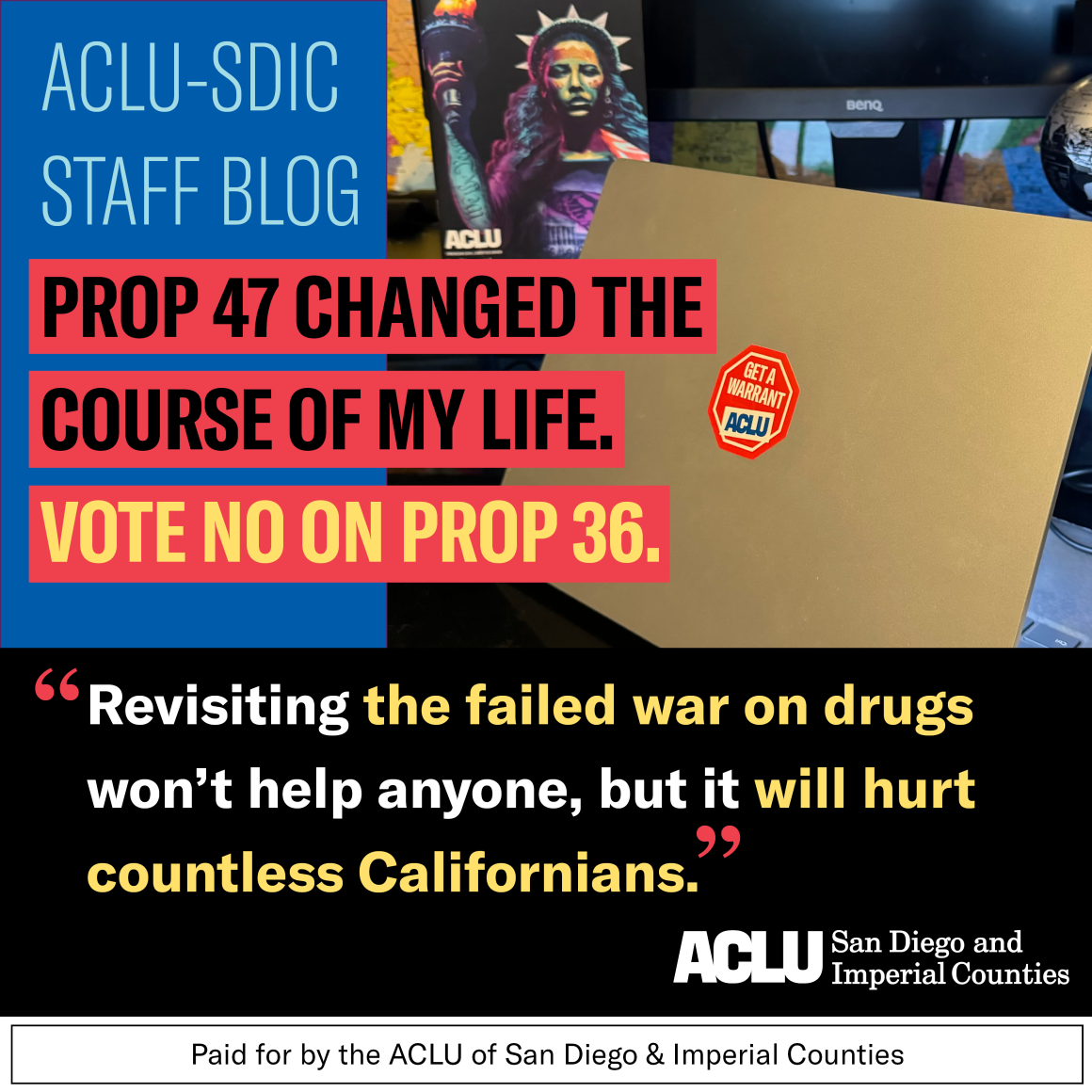
I am the deputy communications director and serve on the senior leadership team at the ACLU of San Diego & Imperial Counties. I spend my days fighting for immigrants’ rights, racial justice, reforms to our criminal legal system and many other important social justice causes. Prior to this, I worked on the ground for five years helping immigrants and people seeking asylum on both sides of the U.S.-Mexico border. The fight for equity, justice and inclusion has been a driving force in my life for quite some time.
Nearly all of us know someone impacted by opiate addiction. In my circles, I am that person. Addiction is one of society’s greatest equalizers – it doesn’t see race, religion, education level or social class. It can happen to anyone. My addiction was an all-consuming saga that completely uprooted my life for years.
Ten years ago, my addiction led to my incarceration at Las Colinas Detention and Reentry Facility.
I was already well on my way into the carceral system in 2014 when California voters made the historic choice to pass Proposition 47, a landmark ballot measure that reclassified low-level offenses from felonies to misdemeanors and redirected cost savings from prisons to rehabilitation services.
I witnessed Prop 47 going into effect in real time – joyous women being released on time served to return to their loved ones. Women all around me were given a second chance – an opportunity to reclaim their lives. My conviction was not for low-level offenses, so I remained in my cell.
Now, a decade later, I’m helping to inform and educate voters on the many important propositions on the November 2024 ballot. This includes Proposition 36, a dangerous measure that, if passed, will undo the successes of Prop 47 and return California to an era of inhumane and costly mass incarceration.
During my first incarceration, I made the best of my time there. I wrote letters to judges for the other women I was in jail with, doing my best to present the systemic failures that contributed to their incarceration. It appeared that many of these women had never thought about their struggles through this lens. My career advocating for equity and justice is not a byproduct of my lived experience. I didn’t become the person I am today “because of my struggles.” I was still the person I am today – despite my struggles.
Being locked in a cell for five months with zero access to programming did little to provide me with the rehabilitation I needed. Predictably, upon my release, I relapsed. However, this time, Prop 47 offered me a lifeline. Rather than a jail sentence, I was given a warning. And that warning was a wakeup call and a chance to get my life back on track. It took a while, but I eventually did it.
Had Prop 47 not passed, I doubt I’d be sitting in my office, writing this blog on my laptop that proudly displays an ACLU “Get a Warrant” sticker. In reality, I’d likely still be caught up in my addiction, trapped in the revolving door of incarceration and recidivism, years away from the actual recovery I was able to achieve only in my freedom.
Prop 36’s incarceration-over-rehabilitation approach threatens the progress California has made under Prop 47. It will prevent people from accessing critical treatment. Prop 36 will cost taxpayers millions of dollars and defund valuable rehabilitation services. Revisiting the failed war on drugs won’t help anyone, but it will hurt countless Californians.
My support system and my community helped me overcome the societal barriers of my formerly incarcerated status. Still, I didn’t feel truly free until the day my expungements became official. After many years of hard work and help from my friends at Pillars of the Community and Community Advocates for Just and Moral Governance (MoGo), I no longer have a felony conviction. During the time I spent living with a “felon” label, life was so much harder than it needed to be.
Today, I’m almost seven years into my recovery. This would not have been possible without Prop 47. I know that my survival and success are anomalies in a rigged criminal legal system. I cope by fighting to unrig that system for others.
The lack of effective rehabilitation programs in California has real-life consequences. Every month or two, someone I know dies of an overdose, a suicide, a police shooting, or from lack of medical care in a local jail or state prison.
Throughout the years, I have witnessed people I love struggle immensely. I’ve also witnessed some of them succeed, graduating from rehab, completing drug court, going back to school and, overall, living happy, productive lives. Much of their success can be attributed to crucial Prop 47-funded programs, as well as other treatment programs all over California.
Like me, many of my friends in recovery look to help others and engage in some form of activism. When people recover, they give back to their communities. I’m sharing my lived experience to shine a light on just one of the countless Prop 47 success stories. While I would have preferred to keep this private, I can no longer be silent in the face of what's at stake.
If Prop 36 passes, what will happen to the people who need Prop 47-funded rehabilitation programs? With California’s already deficient rehabilitation options, we truly cannot afford to find out.
It is up to us, people who believe in rehabilitation over incarceration, to speak our truth and to push forward a new vision of justice that prioritizes prevention over punishment. Vote No on Prop 36.
Paid for by the ACLU of San Diego & Imperial Counties.